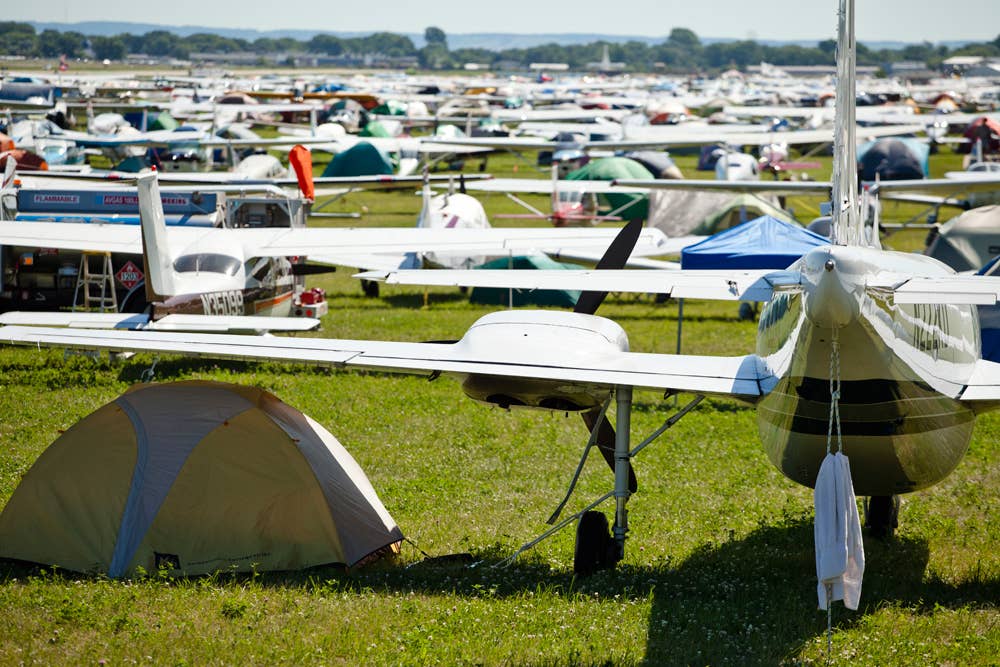FLYING’s Reader Advice on Buying, Selling Aircraft
Owners offer their top tips for making that special purchase—and share some regrets.

Hundreds of thousands of pilots and aviation enthusiasts will attend EAA AirVenture in Oshkosh, Wisconsin—no doubt confronting the temptation of buying or selling their own GA aircraft. [FLYING file photo]
The countdown is on, and within days hundreds of thousands of pilots and aviation enthusiasts will attend EAA AirVenture in Oshkosh, Wisconsin—no doubt confronting the temptation of buying or selling their own GA aircraft.
FLYING asked readers for their best advice when it comes to buying and selling general aviation aircraft and if they had any regrets after a deal was struck.
Here are some of the top responses:
Top Tips
"Aircraft ownership is great, but don't buy unless you can hangar your purchase. The best aircraft out there have a tailwheel. If you must buy a tricycle gear airplane, don't worry about buying the newest one, as they are the most expensive."
—Glider pilot who also owns a Taylorcraft and a V-tail Bonanza in Holtville, California
"Be sure it's got good bones—no corrosion or significant damage."
—Commercial pilot with single-engine land rating
"If you're buying with partners, recognize the partners you choose are even more important than the aircraft itself. A poor partnership experience can ruin even the best of aircraft."
—Commercial pilot from York, Pennsylvania
"If selling, have all logs in order and digitized. Be accurate and complete describing aircraft including any inoperable equipment, damage history, or hail damage. Have good digital photos to share. Be friendly on the phone and in person. If buying, look for all of that mentioned, have a prepurchase inspection done by a disinterested A&P, get a title search, and copy of all the aircraft data available from [the FAA in] Oklahoma City, and be sure you can get insurance for it."
—Pilot with more than 59 years experience with a commercial certificate, and instrument and ASMEL ratings from Springfield, Missouri
"If buying, [get] a thorough prepurchase inspection by a reputable A&P/IA. This could also serve as a fresh annual inspection. Any airworthiness issues found should be points for price concession or sellers responsibility."
—ATP/CFII/MEI FBO owner and operator for more than 20 years, aircraft broker, and Bonanza owner
"Determine make and model you’re interested in, join a type forum for the plane you like, then read and learn all you can before buying. Before you actually plunk money down, ask your forum members for a recommendation of a qualified A&P—one who is familiar with the plane in question—in the area of the seller to do a thorough pre-buy. Yes, it costs, but this is like money in the bank. Don’t skip this!"
—Reader with some flight experience from Hanover, New Hampshire
"Establish [a] budget and do not spend more than 75 percent on the plane. Keep the rest in reserve. You will need it! Realize that if the plane is not near you, you may be spending $2,000 or more just to get it home."
—Pilot who first soloed in 1963 and later flew in the U.S. Navy Reserve from Eugene, Oregon
"Do your homework first. Can you really afford the hanger fee, insurance, fuel, maintenance expenses, etc.? It might be more cost-effective to rent when needed instead of owning an aircraft."
—Pilot with experience flying Piper P118A, Cessna 172, Cessna 182 Wren and Cessna 182 Robertson STOL aircraft from Austin, Texas
Buyer's Remorse
"I should have done a title search beforehand, as I had the plane for many years. The bank did not file the paperwork properly with the FAA when the loan was paid off, and I had no idea about this until a title search was done."
—Private pilot for more than 40 years from Mount Airy, Maryland
"Not a regret necessarily, but the first annual inspection resulted in many items that ‘could’ have been deferred. We decided to fix all of them. Advice to prospective buyers: have 10 percent of the purchase price set aside for the first annual. If this seems like too much cash to cough up, you may want to reevaluate your financial ability to buy the airplane. If you don't end up using 10 percent on maintenance the first year, consider it a bonus back to yourself."
—Pilot who flies for personal and business purposes (commercial certificate with single-engine land, multiengine land, and instrument airplane ratings with private rotorcraft helicopter privileges) from Southern California
"I regret not thoroughly reviewing logbooks."
—Pilot with more than 40 years experience and a full-time aircraft broker from Carefree, Arizona
"As I begin to use the aircraft more for travel and less for just recreation, I am strongly considering an IFR upgrade, but the cost is considerable. Had I been where I am now, I might have held out for an already IFR airplane or one that could be made so without a large amount of upgrades. However, I really liked that particular airplane, and it met the mission at the time. (I wasn't even IFR rated when I purchased, though I knew I would be getting my rating soon.)”
—Pilot with ASEL on a commercial certificate, a CFII, and tailwheel ratings from Houston
"Not a regret, but I would have looked closer at a known issue, which was not as simple of a fix as I was told. Not a deal-breaker but did take more time and money than anticipated."
—Commercial pilot with rotor, and fixed wing CFII, MEI, G12T instructor pilot from Dothan, Alabama
"I sold for about a third of what I had invested."
—Pilot flying since 1973 with ASEL, ASES, and helicopter ratings

Subscribe to Our Newsletter
Get the latest FLYING stories delivered directly to your inbox






